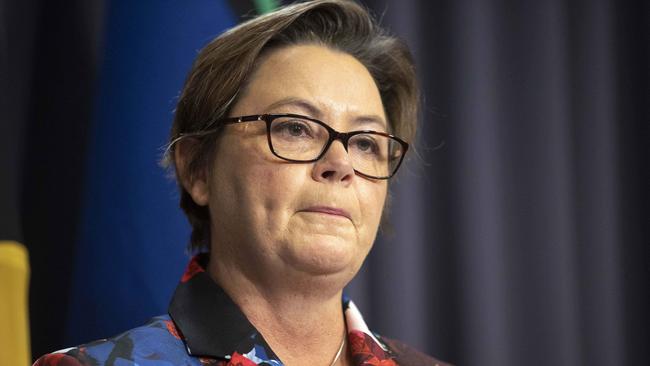Labor to hold critical minerals talks, rules out special treatment for major polluters
Labor will meet with state and territory ministers about its emerging critical minerals strategy, as it ruled out special treatment for polluting producers unable to meet new targets.

Resources Minister Madeleine King said the Albanese government will convene a meeting of resources ministers on its critical minerals strategy in early 2023 in a bid to break down “barriers” between the Commonwealth and states in boosting the industry.
Labor will release an update on the nation’s critical minerals strategy in the next few months and Ms King told The Australian’s Critical Minerals Summit there needed to be a united approach to develop the industry in Australia.
“We will be, in the new year, hopefully bringing all the resources ministers together for a discussion in the context of the critical minerals strategy that we‘re refreshing. There will be an opportunity for us all to talk about how we see the barriers between the federal and state jurisdictions.”
The federal government is tightening the safeguard mechanism policy, hiking targets for big emitters, but Ms King appeared to rule out any special treatment for polluting producers in the critical minerals industry such as lithium hydroxide plants.
“These projects started before reforms of the safeguard mechanism. Nonetheless, if they go over that threshold then they are captured by it, and they’ll have to work with Minister Bowen and his team to find the right solution to the challenge.”
The operators of 215 large industrial facilities – contributing 28 per cent of Australia’s emissions – will be required to cut emissions under Energy Minister Chris Bowen’s overhaul of the safeguard mechanism. The scheme is due to kick in from July 2023.
Emitters in heavy industry that found it difficult to cut emissions could look to both carbon offset markets along with the nascent carbon capture and storage industry in Australia as options.
“I think what’s really important that if an industry is hard to abate, there has to be other options available whether that’s through a trusted and reliable international carbon credit trading system. It’s a really important aspect to this, because it’s a whole other trade that we can enter into,” Ms King said.
Energy Minister Chris Bowen appointed former chief scientist Ian Chubb to carry out a review of Australia’s carbon credit scheme following allegations by whistleblower Andrew Macintosh that a majority of credits issued by the Clean Energy Regulator were flawed.
Mr Bowen has said the government would only consider international offsets in the safeguard mechanism if the units are of high integrity and the mitigation outcome can be formally transferred to count towards Australia’s Paris Agreement commitments.
The addition of international offsets, which would require legislative changes and not feature in the initial enhanced mechanism, could complement government plans to develop regional carbon markets through the Indo-Pacific carbon offsets scheme.
Current definitions suggest nearly 80 per cent of covered emissions and over half or 118 of all safeguard facilities could be classified as emissions-intensive and trade-exposed industries, with exemptions potentially undermining climate change goals.
Ms King was critical of the Coalition‘s existing critical minerals blueprint and its failure to focus on emissions.
“It doesn’t link critical minerals to decarbonisation at all. Doing a word search of the current document, you’ll find the word net zero or climate change once. That’s why I’m baffled because that is the driving force behind critical minerals.”
The Albanese government slashed more than $250m from Coalition-era programs supporting carbon capture utilisation and storage and other low emissions technologies in the federal budget, but Ms King said the technology would still play a part in the overall mix of methods available to polluters.
“We need to get more runs on the board with CCS. There are many projects around the world and the International Energy Agency says we won‘t get to net zero without developing that technology in our field. Some countries are putting more effort into that - but these are all things that have to be available to high emitting projects.”





To join the conversation, please log in. Don't have an account? Register
Join the conversation, you are commenting as Logout